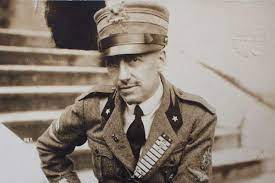Younger brother of the poet and writer G.K. Chesterton
Educated at St. Paul’s School in London, Cecil went on to train as a surveyor and estate agent. He wrote for “The New Age” magazine and later worked for a publishing company.
In 1912 Cecil purchased Hilaire Beloc’s magazine “The Eye-Witness” and re-named it “The New Witness”, editing the magazine for four years. In 1916, he married writer and journalist Ada Elizabeth Jones.
During the First World War, Cecil joined The Highland Light Infantry as a Private and served on the Western Front. Wounded three times he returned to the trenches and was taken ill but refused to leave his post before the Armistice was signed. Cecil was taken into hospital where he died on 6th December 1918 with his wife at his side. Ada was also able to attend her husband’s funeral. Cecil was buried in Terlincthun British Cemetery, Wimille, Pas de Calais, France.
Cecil had poems published in twelve WW1 poetry anthologies.
"FRANCE"
BECAUSE for once the sword broke in her hand,
The words she spoke seemed perished for a space;
All wrong was brazen, and in every land
The tyrants walked abroad with naked face.
The waters turned to blood, as rose the Star
Of evil Fate denying all release.
The rulers smote, the feeble crying "War!"
The usurers robbed, the naked crying "Peace!"
And her own feet were caught in nets of gold,
And her own soul profaned by sects that squirm,
And little men climbed her high seats and sold
Her honour to the vulture and the worm.
And she seemed broken and they thought her dead,
The Overmen, so brave against the weak.
Has your last word of sophistry been said,
O cult of slaves? Then it is hers to speak.
Clear the slow mists from her half-darkened eyes,
As slow mists parted over Valmy fell,
As once again her hands in high surprise
Take hold upon the battlements of Hell.
From “A Treasury of war poetry: British and American poems of the World War, 1914 – 1917” (Houghton & Miflin, Boston, Mass., USA, 1917)
Sources: Wikipedia, Find my Past and
Catherine W. Reilly.- “English Poetry of the First World War: A Bibliography” (St. Martin’s Press, New York, 1978) p. 83.
NOTE: "Oppy Wood, 1917, Evening" by John Nash (Art. IWM ART 2243)
Oppy Wood is in Arras, France. After the fall of Vimy Ridge, the Germans withdrew to the high ground of Oppy Wood, North East of Arras, The Capture of Oppy Wood was an engagement between May and June 1917.
John Northcote Nash CBE, RA (11 April 1893 – 23 September 1977) was a British artist. He was the younger brother of the artist Paul Nash. John's health initially prevented him enlisting at the outbreak of the First World War but his health improved and from November 1916 to January 1918 he served in the Artists Rifles, the unit that his brother had joined in 1914 before taking a commission in the Hampshire Regiment. John served as a sergeant at the Battle of Passchendaele and at the battle of Cambrai. On the recommendation of his brother, from 1918 John worked as an official war artist from 1918.













